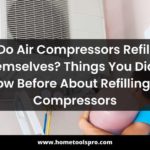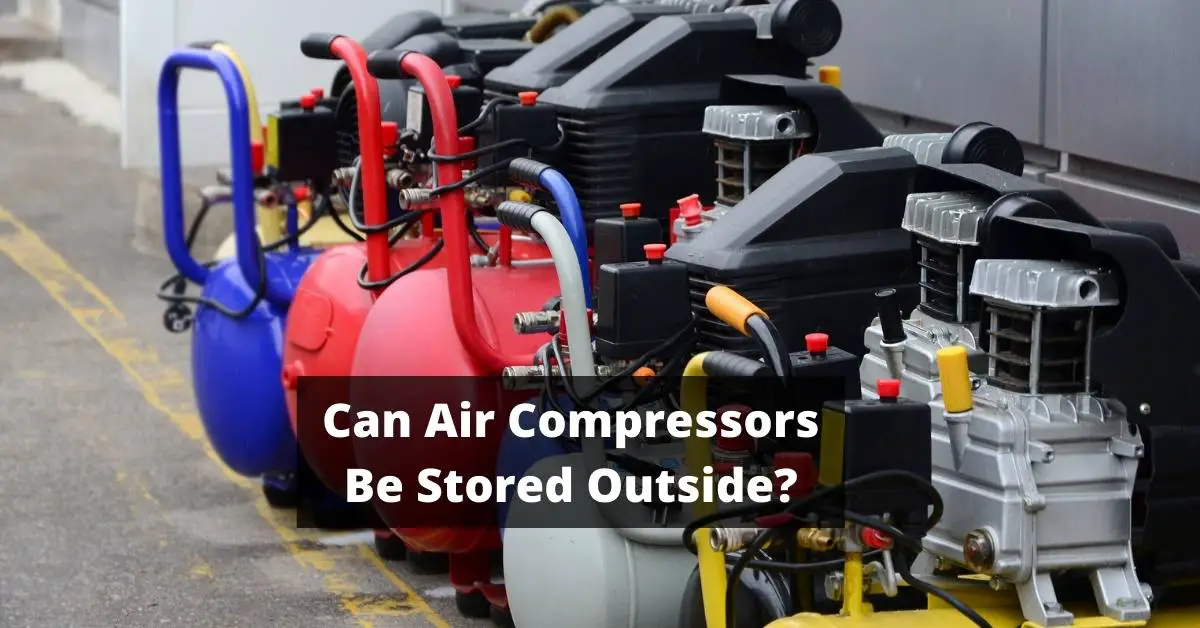Do Air Compressors Have Air Filters?
It’s important to note that not all air is created equal.
In fact, air compressor manufacturers typically include an air filter within the machine itself in order to ensure that the air being pumped is clean and free of debris.
Air compressor filters help protect the machine from damage and keep the air pumped clean and free of contaminants.
Also, not all air compressors are created equal. Some models may have more robust air filtration systems than others.
If you’re using an air compressor in any capacity, it’s important to be aware of the role that these filters play in keeping your machine running smoothly.
How Does the Air Filtration of an Air Compressor Work?

An air compressor is a device that converts power (usually from an electric motor) into kinetic energy by compressing and pressurizing air.
The filtered air is then delivered to the tools or devices that require it. Air compressors come in a variety of shapes and sizes, but all work on the same principle.
The air compressor has two main jobs: to filter the air and compress the air.
The compressor part of the device pumps the air into a holding chamber, where it is then compressed. This increase in pressure allows the air to occupy a smaller space, which makes it easier to store and use.
The second job of the air compressor is to filter the air. Air compressors usually have two filters: an intake filter and a discharge filter.
The intake filter cleans the air before it enters the compressor, while the discharge filter catches any particles that might be produced during compression.
Visual Explanations: https://www.youtube.com/watch?v=rgov4h_N7hM
What are the Types of Air Filters in an Air Compressor?
Intake filters:
The intake filter is the first line of defence against particulates in the air.
Its purpose is to remove particles, such as dust, pollen, and other airborne contaminants, from the air before it enters the compressor.
Inline (Discharge) Filters:
Inline filters are installed between the compressor and the point of use in the airline.
Their purpose is to remove particulates from the compressed air as it flows through the airlines.
How do you identify the right time to change the Air Filters of an Air Compressor?

It’s important to change the air filters of your air compressor regularly. But how often should you do it? And what are the signs that it’s time for a change?
Here are a few tips on how to identify the right time to change your air compressor’s air filters:
Check the manufacturer’s recommendations:
This is always a good place to start. Your air compressor manufacturer will have specific recommendations on how often to change the air filters. So, be sure to check those before making any decisions.
Inspect the air filter regularly:
You should also be inspecting the air filter regularly, even if it’s not time for a change yet. If you notice any buildup of dirt or debris, it’s probably time for a change.
Listen to your air compressor:
If your air compressor starts making strange noises, it could be a sign that the air filter is dirty and needs to be changed.
Check the pressure gauge:

If you notice a drop in pressure when using your air compressor, it could also be a sign that the air filter is dirty and needs to be replaced.
Watch for decreased performance:
If you notice that your air compressor isn’t performing as well as it used to, it’s probably time for a new air filter.
These are just a few tips on how to identify the right time to change your air compressor’s air filters.
If you have any doubts, it’s always best to consult with a professional.
They can help you make sure that you’re changing the air filters at the right time and keeping your air compressor in good working condition.
Visual Explanations: https://www.youtube.com/watch?v=4FIqG69yGqU
What are the Bad Effects on an Air Compressor if the Air Filters are dirty?

As air compressors work, they take in air from the surrounding environment and compress it.
This process can cause dirt and other particles to enter the compressor, which is why it’s important to have clean air filters.
If the filters are dirty, it can cause a number of problems for the compressor. The most obvious problem is that it can reduce the efficiency of the machine.
This means that it will take longer to compress the air and use more energy in the process. Additionally, dirty filters can cause the compressor to overheat and break down prematurely.
Another problem that can occur is that dirty air filters can allow contaminants to enter the compressed air stream.
This can potentially damage tools or products used with compressed air, and it can also be dangerous to workers exposed to the contaminated air.
Overall, it’s very important to keep air compressors clean, and that includes changing the air filters on a regular basis. By doing so, you can avoid a number of problems and ensure that your compressor lasts for a long time.
Is it possible to Clean the Air Filters of an Air Compressor and reuse them?
It is possible to clean the air filters of an air compressor and reuse them. However, it is important to note that the lifespan of the filter will be shortened after each cleaning.
To keep your air compressor running smoothly, you can regularly clean or replace the air filters. Depending on the type of compressor you have, the filters may need to be cleaned as often as every week or two.
More heavy-duty compressors may only require filter changes every month or so.
To clean the filters, remove them from the compressor and use a brush or compressed air to remove any dust or debris. If the filters are extremely dirty, they may need to be replaced.
Always check your owner’s manual for specific instructions on maintaining your particular air compressor model.
What are the other types of filters in an Air Compressor than the Air Filters?

Oil filters:
Oil filters are used in air compressors to remove contaminants from the lubricating oil used in the compressor.
The oil filter protects the compressor against wear and helps to prolong its life. It is important to choose the correct oil filter for your specific compressor model to ensure optimal performance.
Many air compressors will have a pre-filter and a final filter, both of which play an important role in protecting the internals of the compressor.
How to extend the longevity of the Air Filters of an Air Compressor with proper maintenance?

Maintaining your air compressor and performing regular checkups are important to ensure its longevity. One of the most important parts of an air compressor is the air filter.
The air filter keeps dust and other particles from entering the compressor and damaging it. Over time, the filter can become clogged with dirt and debris, which reduces its efficiency.
To extend the life of your air filters, follow these tips:
- Inspect the air filters regularly and clean or replace them as needed.
- Avoid operating the compressor in dusty or dirty environments.
- Use a pre-filter to protect the air filter from large particles.
- Store the compressor in a clean, dry place when not in use.
By following these tips, you can extend the life of your air filters and keep your air compressor running smoothly.
Related Matters
What filters do I need for an air compressor?
The two filters you’ll need for an air compressor are the intake filter and the Discharge filter.
When purchasing filters for an air compressor, there are a few factors you’ll want to keep in mind. Each filter will have a different airflow rating, which is the number of cubic feet of air per minute that the filter can process.
You’ll also want to make sure the filters are compatible with the compressor’s intake system and that they fit the space available.
Does my air compressor need a water separator?
Air compressors are often used in applications with moisture contamination risk, such as in food and beverage processing, pharmaceuticals, and electronics manufacturing.
In these cases, it is essential to use a water separator to remove any moisture from the air before it enters the compressor.
Water separators work by using a coalescing filter to trap small water droplets and separate them from the air stream. This ensures that your air compressor stays dry and free of corrosion-causing moisture.
How does a compressor oil separator work?
A compressor oil separator is a device that separates oil from compressed air.
The separator typically consists of a mesh screen or filter that traps oil droplets as the air passes through it.
The separated oil is then collected in a reservoir for later use.
Compressor oil separators play an important role in maintaining compressed air quality.
They help to remove harmful contaminants from the air stream, which can damage equipment or cause problems with product quality.
In addition, they help to reduce maintenance costs by prolonging the life of the equipment and reducing unplanned downtime.




